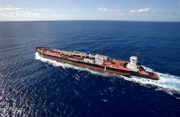 The port and maritime sector can be an impressive driver of our economy — our ports support 13 million jobs, port activity injects more than $3.15 trillion into the U.S. economy, and one in five dollars spent here is related to port and maritime activity.
The port and maritime sector can be an impressive driver of our economy — our ports support 13 million jobs, port activity injects more than $3.15 trillion into the U.S. economy, and one in five dollars spent here is related to port and maritime activity.
Luckily for the economy and transportation workers, President Obama has read the numbers and is now expediting several major infrastructure projects, including some at five major seaports.
But as incredible as those numbers are, here’s another: It can take 10 years to conduct federal government seaport feasibility studies, without which authorities cannot modernize these havens of commerce. Expediting these projects makes good sense. Fortunately President Obama has read the numbers and made an important decision for the U.S. economy, shippers and port and maritime workers — we can’t wait.
You’ll be blown away to know that while the President gets it, Mitt Romney doesn’t. As Governor of Massachusetts – yes, the home for the Massachusetts Maritime Academy – Mitt Romney said, “We don’t have much of a Merchant Marine in Massachusetts.” In fact, Romney proposed closing the Academy in 2003 at the same time that 50 cargo vessels were carrying supplies to Kuwait and other Persian Gulf nations supporting U.S. missions overseas, all of them operated by Academy grads, many working in Boston Harbor.
As Capt. Albert Wilson, a director at the Academy said at the time, “Yes Governor, there is a Massachusetts Merchant Marine, and Massachusetts Maritime Academy minds the helm.”
Perhaps Romney never made it down to the ports. Given his economic strategy for Massachusetts, transportation workers can only hope the governor won’t be minding the nation’s helm, ignoring the numbers on this industry’s importance to the overall economy.
As part of Obama’s We Can’t Wait initiative, which calls for the acceleration of major infrastructure projects at five U.S. ports, the federal permit process will be put on a faster track to speed such projects.
Infrastructural modernization, as fancy as it sounds, plainly means giving ports the capability to deliver for the economy. That means more business for U.S. ports. That means more jobs in the ports, on the vessels, in other transportation sectors such as rail and trucking and in the supplier and service sectors. The problem with Mitt Romney is that he doesn’t understand any multiplier effect that doesn’t enrich billionaire investors. The real economy doesn’t work that way and only one candidate for office – yes, the guy with the funny name – gets it.
Needless to say, this is good news for U.S. transportation workers who will see job growth; it is good news for our system of freight commerce, and it is even better news for the private sector and consumers that will enjoy the benefits of expanded and more efficient ports.
Let’s hope that those who are fond of labeling public investments as bad big-government policies, including Mitt Romney, might pause and realize that nearly 80 percent of the volume of international trade comes and goes through our ports. If we do this right, the American economy will get the jump-start it sorely needs and we will revitalize a port and maritime sector that has been the victim of neglect and indifference.
President Obama is correct: We Can’t Wait.
-@TTDAFLCIO